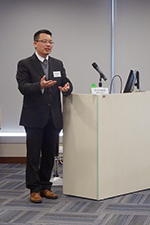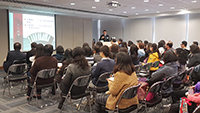 Lin Zhi Xiu Lin Zhi Xiu
Acting Director, School of Chinese Medicine, CUHK
Professor Lin graduated from the Guangzhou University of Chinese Medicine in 1987 with a BSc in Chinese Medicine. After graduation, he worked as a Chinese medicine doctor at the Affiliated Hospital of Guangdong Provincial Research Institute of Chinese Medicine. In 1991, he moved to England to study English language. Subsequently, he studied at the Department of Pharmacy, King's College London, where he obtained his PhD in Pharmacognosy in 1999. From 1998 to 2002, he was employed as a Senior Lecturer in the Chinese Medicine Programme at Middlesex University in London, where he was involved in the basic and clinical teaching of Chinese medicine. Professor Lin joined CUHK in 2003 and is now an Associate Professor at the School of Chinese Medicine, where he is responsible for teaching Chinese medicine and supervising postgraduate students' research projects. His current research focuses on (1) the pharmacological studies of Chinese medicine in psoriasis, eczema, pancreatic cancer and neuroprotection; (2) systematic reviews on the effectiveness and safety of Chinese medicine treatment of some major diseases; and (3) the effectiveness of acupuncture for the treatment of post-stroke dysphagia and overactive bladder syndrome. He has published over 140 Chinese medicine-related articles in local and international journals, including around 110 SCI articles.
Professor Lin first introduced the notion of harmony between nature and human. According to Chinese medicine, nature and human are closely related with each other, and it is essential for humans to live in harmony with the changes in nature. Harmony between nature and human is the foundation of Chinese philosophy and the essence of Chinese medicine theory and clinical practice. The master of Chinese culture, Mr Qian Mu, pointed out in his article "The Contribution of Chinese Culture to Human's Future" that unity between nature and humanity entails a unique understanding of the relationship in Chinese culture, and it is China's greatest contribution to the world. One of the most important texts of Chinese medicine, the Huangdi Neijing, also describes the harmony between nature and human, such as "man responds to heaven and earth" and "man is born of the qi of heaven and earth and completed through the laws of the four seasons". Basically, the notion of harmony between nature and human in Chinese medicine refers to two disciplines. First, people should adjust their life activities according to the changes in the yin and yang of nature. People are healthy when they adjust and become sick when they do not. Second, the physiological activities and pathological changes in the human body are similar to the changes in nature. Thus, studies of the changes in nature can be applied to understand physiological activities and pathological changes of human body. Chinese medicine emphasises the influence of nature, such as the seasons and geographical environment, on people's physiological activities and pathological changes, and different treatments are prescribed accordingly.
Professor Lin went on to explain how the notion of harmony between nature and human deeply influences the principles of life cultivation in Chinese medicine, the most important principle of which is that people should take care of their bodies by maintaining harmony with nature, meaning that they need to adjust to changes in nature and maintain a balance between their bodies and the environment. To maintain health and extend longevity, Chinese medicine suggests various methods for people to respond to the natural rhythms of the four seasons and yin and yang, such as "nourishing yang in spring and summer and nourishing yin in autumn and winter" and "pathogenic evils and villainous winds are to be avoided".  Professor Lin talked in detail about how Chinese medicine recommends different foods and lifestyles for people to maintain good health in the changing rhythm of the four seasons. In spring, people can eat more foods that nourish the yang in the body, such as leeks, garlic, chives, crown daisies and caraway. However, foods that can strongly enhance yang, such as ginseng, young pilose antler and monkshood, are not suitable for spring. As the days become longer in spring, people should go to bed later and wake up earlier to respond to the ascending qi in nature. In summer, it is suitable to eat more foods that clear heat and promote diuresis in the body, such as watermelon, bitter gourd, tomatoes, green beans and cucumbers. Summer is also the best time for people to take the Tian Jiu treatment to help strengthen their yang qi. The Tian Jiu treatment, a traditional Chinese medicine therapy mainly done during the hottest days of summer, involves the application of a paste made from powdered Chinese medicine herbs onto designated acupuncture points to stimulate and regulate the meridian and collateral system to prevent diseases that are more likely to occur in winter when the yang qi is weak. People should go to bed late in response to a lack of yin in summer and wake up early because of the abundance of yang. In autumn, people should eat more foods that nourish yin to hydrate the body because the dryness of autumn can hurt the yin qi. Foods such as sesame, honey, pears, white fungus and cubilose are very suitable for autumn. As the days become shorter, it is better to sleep early to prevent the loss of yin and to wake up early to strengthen yang. In winter, people should nourish yin and sustain yang. They should avoid the cold and keep warm, smooth yang and protect yin to maintain a balance between yin and yang. High-calorie foods that nourish yin and suppressing hyperactive yang are suitable for winter, such as lamb, duck, goose, daikon and chestnuts. As it becomes extremely cold in winter, people can consume hot pot dishes to keep warm and sustain yang qi. People should go to sleep early to keep warm and maintain yang qi and wake up after sunrise to avoid cold to nourish yin qi. Professor Lin pointed out that life cultivation in Chinese medicine also takes the geographical environment into consideration, such as regions, climates and people's life customs and habits. For instance, people in northern China usually face severe cold weather, so they need to consume more foods that can help them maintain a high level of heat, such as beef, lamb, ginseng and pilose antler. In contrast, the weather in southern China is wet and humid, so people should consume foods that help to eliminate dampness in the body, such as pigeon, chicken, shashen, coixseed and green beans. Professor Lin talked in detail about how Chinese medicine recommends different foods and lifestyles for people to maintain good health in the changing rhythm of the four seasons. In spring, people can eat more foods that nourish the yang in the body, such as leeks, garlic, chives, crown daisies and caraway. However, foods that can strongly enhance yang, such as ginseng, young pilose antler and monkshood, are not suitable for spring. As the days become longer in spring, people should go to bed later and wake up earlier to respond to the ascending qi in nature. In summer, it is suitable to eat more foods that clear heat and promote diuresis in the body, such as watermelon, bitter gourd, tomatoes, green beans and cucumbers. Summer is also the best time for people to take the Tian Jiu treatment to help strengthen their yang qi. The Tian Jiu treatment, a traditional Chinese medicine therapy mainly done during the hottest days of summer, involves the application of a paste made from powdered Chinese medicine herbs onto designated acupuncture points to stimulate and regulate the meridian and collateral system to prevent diseases that are more likely to occur in winter when the yang qi is weak. People should go to bed late in response to a lack of yin in summer and wake up early because of the abundance of yang. In autumn, people should eat more foods that nourish yin to hydrate the body because the dryness of autumn can hurt the yin qi. Foods such as sesame, honey, pears, white fungus and cubilose are very suitable for autumn. As the days become shorter, it is better to sleep early to prevent the loss of yin and to wake up early to strengthen yang. In winter, people should nourish yin and sustain yang. They should avoid the cold and keep warm, smooth yang and protect yin to maintain a balance between yin and yang. High-calorie foods that nourish yin and suppressing hyperactive yang are suitable for winter, such as lamb, duck, goose, daikon and chestnuts. As it becomes extremely cold in winter, people can consume hot pot dishes to keep warm and sustain yang qi. People should go to sleep early to keep warm and maintain yang qi and wake up after sunrise to avoid cold to nourish yin qi. Professor Lin pointed out that life cultivation in Chinese medicine also takes the geographical environment into consideration, such as regions, climates and people's life customs and habits. For instance, people in northern China usually face severe cold weather, so they need to consume more foods that can help them maintain a high level of heat, such as beef, lamb, ginseng and pilose antler. In contrast, the weather in southern China is wet and humid, so people should consume foods that help to eliminate dampness in the body, such as pigeon, chicken, shashen, coixseed and green beans.
Professor Lin concluded by saying that the philosophical idea of harmony between nature and human is the foundation for life cultivation in Chinese medicine and that following the disciplines can help people maintain good health. |














